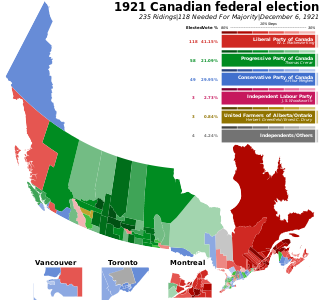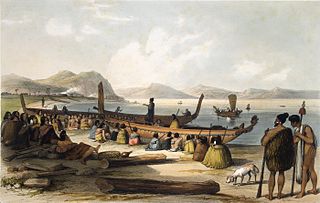Party discipline is a system of political norms, rules and subsequent respective consequences for deviance that are designed to ensure the relative cohesion of members of the respective party group. In political parties specifically, the essential purpose of party discipline is to get all its parliamentary members to maintain the party line and vote in support of policies agreed to by a majority of the parliamentary members.
A conscience vote or free vote is a type of vote in a legislative body where legislators are allowed to vote according to their own personal conscience rather than according to an official line set down by their political party. In a parliamentary system, especially within the Westminster system, it can also be used to indicate crossbench members of a hung parliament where confidence and supply is provided to allow formation of a minority government but the right to vote on conscience is retained. Free votes are found in Canadian and some British legislative bodies; conscience votes are used in Australian and New Zealand legislative bodies.
A whip is an official of a political party whose task is to ensure party discipline in a legislature. This means ensuring that members of the party vote according to the party platform, rather than according to their own individual ideology or the will of their donors or constituents. Whips are the party's "enforcers". They work to ensure that their fellow political party legislators attend voting sessions and vote according to their party's official policy. Members who vote against party policy may "lose the whip", being effectively expelled from the party.
The Progressive Party of Canada, formally the National Progressive Party, was a federal-level political party in Canada in the 1920s until 1930. It was linked with the provincial United Farmers parties in several provinces, and it spawned the Progressive Party of Saskatchewan, and the Progressive Party of Manitoba, which formed the government of that province. The Progressive Party was part of the farmers' political movement that included federal and provincial Progressive and United Farmers' parties.

The 1921 Canadian federal election was held on December 6, 1921, to elect members of the House of Commons of Canada of the 14th Parliament of Canada. The Union government that had governed Canada through the First World War was defeated, and replaced by a Liberal government under the young leader William Lyon Mackenzie King. A new third party, the Progressive Party, won the second most seats in the election.
A crossbencher is a minor party member of some legislatures, such as the British House of Lords and the Parliament of Australia. They take their name from the crossbenches, between and perpendicular to the government and opposition benches, where crossbenchers sit in the chamber.
The Chief Whip is a political leader whose task is to enforce the whipping system, which aims to ensure that legislators who are members of a political party attend and vote on legislation as the party leadership prescribes.

The Jatiya Sangsad, often simply referred to as Sangsad and also known as the House of the Nation, is the supreme legislative body of Bangladesh. The current parliament of Bangladesh contains 350 seats, including 50 seats reserved exclusively for women. Elected occupants are called members of Parliament, or MPs. The 12th national parliamentary election was held on 7 January 2024. Elections to the body are held every five years, unless a parliament is dissolved earlier by the president of Bangladesh.

The 39th Canadian Parliament was in session from April 3, 2006 until September 7, 2008. The membership was set by the 2006 federal election on January 23, 2006, and it changed only somewhat due to resignations and by-elections. The Parliament was dissolved on September 7, 2008, with an election to determine the membership of the 40th Parliament occurring on October 14, 2008.
Party switching is any change in political party affiliation of a partisan public figure, usually one currently holding elected office.

In New Zealand politics, waka-jumping is a colloquial term for when a member of Parliament (MP) either switches political party between elections or when a list MP's party membership ceases.
Floor crossing was a system introduced to the post-apartheid South African political system in 2002, under which members of Parliament, members of provincial legislatures and local government councillors could change political party and take their seats with them when they did so. Floor crossing in South Africa was abolished in January 2009.

The 40th Canadian Parliament was in session from November 18, 2008 to March 26, 2011. It was the last Parliament of the longest-running minority government in Canadian history that began with the previous Parliament. The membership of its House of Commons was determined by the results of the 2008 federal election held on October 14, 2008. Its first session was then prorogued by the Governor General on December 4, 2008, at the request of Prime Minister Stephen Harper, who was facing a likely no-confidence motion and a coalition agreement between the Liberal party and the New Democratic Party with the support of the Bloc Québécois. Of the 308 MPs elected at the October 14, 2008 general election, 64 were new to Parliament and three sat in Parliaments previous to the 39th: John Duncan, Jack Harris and Roger Pomerleau.

Candice Marie Bergen is a Canadian politician who served as the member of Parliament (MP) for Portage—Lisgar in Manitoba from 2008 to 2023. She served as the interim leader of the Conservative Party and the leader of the Opposition from February 2, 2022 to September 10, 2022.

Mark John Reckless is a British lawyer and former politician who served as a Member of the Senedd (MS) for South Wales East from 2016 until 2021, having previously served as Member of Parliament (MP) for Rochester and Strood from 2010 to 2015. Initially a member of the Conservative Party, he crossed the floor to join the UK Independence Party (UKIP) in September 2014. He has since changed parties a further three times.
Aaya Ram Gaya Ram is a Hindi expression referring to the practice of turncoating, or switching parties in the context of a legislative body. The term originated in 1967 in Haryana when the Member of the Legislative Assembly Gaya Lal shifted his party allegiances thrice within a fortnight. Lal’s behavior eventually resulted in the imposition of President’s rule in Haryana later that year. Further pressure resulted in the passage of an anti-defection law in 1985. However, the practice of defection is still found today in state legislatures, albeit to a more limited extent.

Anthony James Holland Mangnall, is a British Conservative Party politician, who serves as the Member of Parliament (MP) for Totnes since 2019.
In Malaysian politics, a frog refers to an act where a politician crosses the bench from one party to another (changing support). This term was first coined in during the 1994 Sabah state elections after United Sabah Party losing its majority even the party won the state elections. Despite its usage nationwide, it is more familiar within the state of Sabah. Since May 25, 2023, nine (9) states of Malaysia has approved the Parties hopping prevention law also known as the "Anti-Switching Parties Law" or "Anti-Hopping Parties Law" for both Parliament and State legislative assembly including Sabah and Sarawak.







